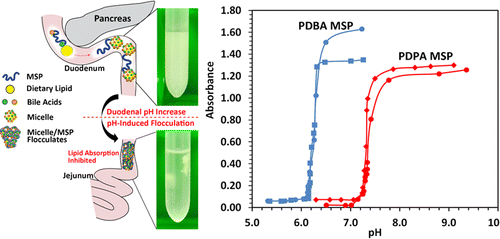To help address the global obesity epidemic, scientists are developing a new class of compounds called "micelle sequestrant polymers," or MSPs, that could prevent fat particles from getting absorbed in the body and thus potentially reduce weight gain. They report on their novel agents, which they tested on mice, in the ACS journal Biomacromolecules.
Research has shown that worldwide, obesity rates have been climbing for years. Treatments for overweight and obesity include diet and exercise, surgery and prescription medications. But currently available drugs can have serious side effects, including increased risk of cardiovascular disease and depression. So Cory Berkland and colleagues set out to find new kinds of pharmaceuticals to fight weight gain.
Targeting the body's process of absorbing fat, the researchers designed a class of polymers that capture fat particles called micelles in the intestines so they can't be digested. Instead, they pass through the gut and are excreted. In tests, mice who took these MSPs had nine to 10 times the amount of triglycerides—the main dietary fat—in their feces than the control animals. Additionally, because the MSPs pass through the body unabsorbed, the researchers say they could provide a safe approach for long-term treatment.
More information: pH-Responsive Micelle Sequestrant Polymers Inhibit Fat Absorption, Biomacromolecules, Article ASAP. DOI: 10.1021/acs.biomac.5b00560
Abstract
Current antiobesity therapeutics are associated with side effects and/or poor long-term patient compliance, necessitating development of more efficacious and safer alternatives. Herein, we designed and engineered a new class of orally acting pharmaceutical agents, or micelle sequestrant polymers (MSPs), that could respond to the pH change in the gastrointestinal (GI) tract and potentially sequester lipid micelles; inhibiting lipid absorption through a pH-triggered flocculation process. These MSPs, derived from poly(2-(diisopropylamino)ethyl methacrylate) and poly(2-(dibutylamino)ethyl methacrylate), were soluble in acidic media, but they transitioned to become insoluble around pH 7.2 and 6.1, respectively. MSPs showed substantial bile acid and triglyceride sequestration capacity with fast pH response tested in vitro. In vivo study showed that orally dosed MSPs significantly enhanced fecal elimination of triglycerides and bile acids. Several MSPs increased fecal elimination of triglycerides by 9–10 times compared with that of the control. In contrast, fecal concentration of bile acids, but not triglycerides, was increased by cholestyramine or Welchol. Importantly, fecal elimination of bile acids and triglycerides was unaltered by addition of control dietary fibers. MSPs may serve as a novel approach to weight loss that inhibits excess caloric intake by preventing absorption of excess dietary triglycerides.
Journal information: Biomacromolecules
Provided by American Chemical Society





















